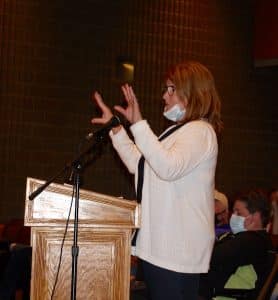Recovery residence vote tabled

Near the end of an over two-and-a-half hour meeting Monday night in the Waterloo High School auditorium, the Waterloo Planning Commission decided to not take action on two petitions regarding a planned recovery residence that would be located at 228 Mueller Lane.
At the recommendation of Waterloo City Attorney Daniel Hayes, the commission tabled a petition to allow a recovery residence as a special use within a B-2 General Business District and removed an item on the agenda to consider a special use permit for the planned residence because it did not fall under the commission’s purview.
Both votes were unanimous, but the tabling vote came after commission members Kevin Hicks and Chuck Pittman made a motion to approve adding the recovery residence definition in state statute to Waterloo’s code.
The rest of the commission voted against that – but not because it was against adding it to the code.
“I think this is a little uncharted territory. It was the language that was in the zoning text that I didn’t like, not necessarily the concept,” commission chairman Nathan Rau stressed. “I feel like we need to define what this residence is in our code better to protect ourselves.”
Illinois defines a recovery residence as “a sober, safe and healthy living environment that promotes recovery from alcohol and other drug use and associated problems.”
Commission members expressed concern that future, more problematic ventures may take advantage of this definition being in Waterloo’s code, so it wants a more specific definition.
Each member will have until May 18 to send his or her definition to Waterloo Code Administrator Nathan Krebel. The commission will work to arrive at a consensus definition Wednesday at 7:30 p.m. in the WHS auditorium during a special meeting.
The commission came to this inconclusive decision after more than 30 individuals voiced their opinions on the matter.
Those for and against the new facility, which is the site of the former Rosedale House senior living community, were split about 50-50, with a few more speakers in favor of the new nonprofit. Among the roughly 100 people in the audience, the applause seemed similarly divided between speakers for and against the proposal.
Among those who spoke against allowing the recovery residence, which would be called Cornerstone Laine, a common refrain was that a facility like the one proposed is necessary but not in this location.
“My renters and I have come to the conclusion that they don’t want to be living in an area where they have to keep their head on a swivel and watch their backs,” said Larry Lauer, who lives and owns property in the nearby subdivision. “There’s kids in the neighborhoods now. I’m afraid there’s going to be crime because of visitors. We don’t need what’s going on in Columbia right this second.”
Per information provided to Waterloo, Cornerstone Laine intends to “provide a Christ-centered, supportive residential recovery environment” for women ages 18 and above through a 90-day program that includes meals, peer support, 12-step programs and a bible study for $8,000. Two scholarships will be available every 90 days.
The nonprofit will be owned and operated by Monroe County residents Adrian and Leisa Martinez, who lost their daughter to an accidental drug overdose, and Art and Beth Deno of the St. Louis-based nonprofit ACPD.
“There are other places to put this rehab center, not where I’ve spent over $300,000 for a home and the amount of taxes that I pay,” said neighboring resident Jim Rapp.
A few people said they lived in areas with what they called similar facilities nearby before moving to Waterloo.
“We had to leave that area because of the gangs, because of the drugs, because of the people who were waiting outside for those people to get out of there,” said Waterloo resident Donna Ward. “For the people who were leaving there, they had nowhere to go. They took up residence in our area and started doing drugs again.”
It was that type of concern that seemed to motivate many of those against allowing the recovery residence.
“I recognize the need for it, I really do,” nearby resident Monica Baker said of having a rehabilitation facility. “But I want to feel safe in my home. I don’t want to get a gun. I don’t want to get a security system. I don’t want to go through all that.”
One Waterloo resident, Mary McNeight, said she was against allowing recovery residences to the zoning code altogether because many of them do not operate above board.
“Rehab is a $35 billion industry with no standard federal regulation whatsoever,” she said. “The majority of rehab centers do not offer evidence-based treatment.”
Many of the people who supported allowing a recovery residence – provided it was not in a neighborhood – suggested the former St. Elizabeth’s Hospital urgicare building at 9538 Caring Way on Route 3.
Concord Presbyterian Church Pastor Will Hesterberg said that was untenable given the cost of the facility.
Monroe County property records show the hospital took out a more than $5.3 million mortgage on the property in 2008. It has retained the lease on the property since the building closed in 2011, though the lease was up last year.
Hesterberg challenged those proposing that site to contribute money toward purchasing a location that expensive.
“If we’re not willing to do that, then that is off the market,” he said.
Those speaking in favor of Cornerstone Laine said that many concerns of nearby residents were misguided or unfounded.
“We all need to realize that everybody who’s addicted doesn’t have 40 tattoos and rings in their ears and is running around with guns,” said Waterloo resident Gerry Dickneite, a retired nurse who worked with chemically dependent people for 20 years. “You know people who are chemically dependent.”
“It’s scary to have in your neighborhood, but it’s already here,” agreed Columbia resident and former Waterloo Applebee’s manager Judy Zanti. “We should be ashamed of ourselves.”
Jason Jones of Waterloo, who spoke in favor of the facility, similarly advised the commission to look at empirical evidence rather than just anecdotal evidence when considering this factor.
Still others spoke about how OK’ing a recovery residence like this proposed one would be the moral course of action.
“We have a problem in this community and we have an answer, and the answer isn’t ‘yeah, but not in our neighborhood.’ It’s ‘if you want to help, that’s what we have to do.’ If you don’t want a drug problem, you have to do something about it,” argued Laura Novak, a psychiatric nurse practitioner who lives here.
Josh Boyer of Waterloo, a pastor at Hope Christian Church and president of the Monroe County Coalition for Drug-Free Communities, also said he supported the recovery residence.
“This is an opportunity to shine some hope and some light in a very dark place,” he said. “I hope you guys vote with some compassion.”
For her part, Leisa addressed a few specific questions from the commission and members of the public.
She stressed that Cornerstone Laine would be a 90-day center that follows the model ACPD, which reports a success rate of 80-85 percent thanks to its process of remaining in touch with individuals for years.
“These are kids, young adults who aren’t on the streets,” Leisa said of potential clients. “The majority of the people, the women coming to us come voluntarily.”
While at the residence, those women would have no vehicle, internet access or cell phone. They also would not have any visitors for their first 30 days and only approved visitors after that.
“The concerns about drugs being brought to the facility or the neighborhood are not valid,” Leisa emphasized.
She further added that there will always be at least two staff members at the facility, including overnight, and that no clients can leave without a staff member.
After the individuals complete the program, they could then return to their homes or go to a transitional living or sober living home.
Leisa also detailed the planned security and privacy features planned for the facility such as a privacy fence, doors that buzz on exit and lock internally, alarms on all doors and windows, cameras in the common areas and overnight check-ins on clients.
She told the Republic-Times that anyone with concerns can email her directly at martinezleisa1@gmail.com.
“We don’t want to be in a hostile environment. We want people to understand our women,” she said.
Once the plan commission holds its special meeting to recommend a more specific definition of a recovery residence, it will pass its advice along to the Waterloo Zoning Board of Appeals.
That body’s next meeting is set for May 20, and Cornerstone Laine is on the agenda. The zoning board will also meet at 7:30 p.m. at WHS.
After the zoning board decides whether to recommend adding recovery residences to the zoning code and whether to give this place a special use permit, the Waterloo City Council will ultimately decide whether to OK it.






